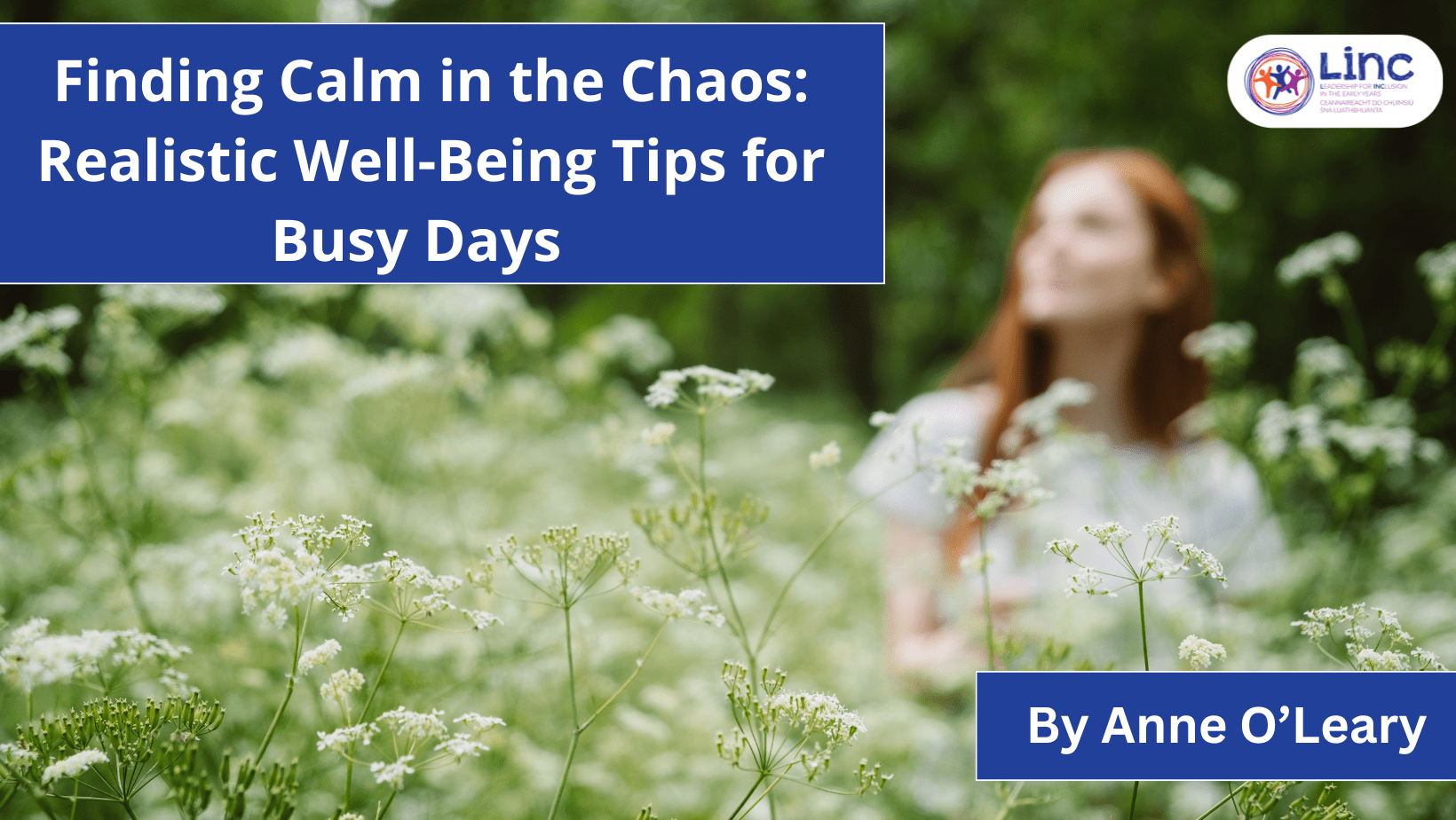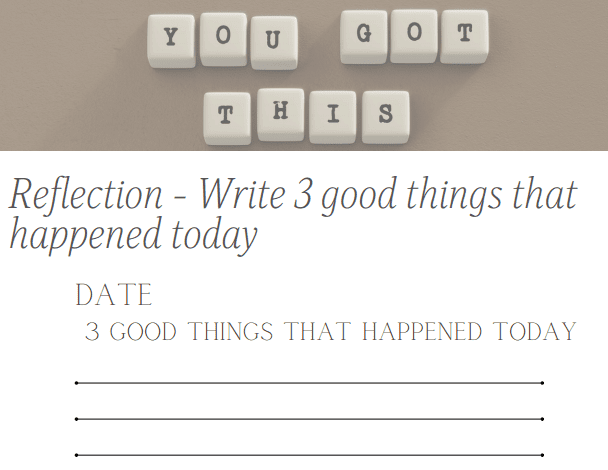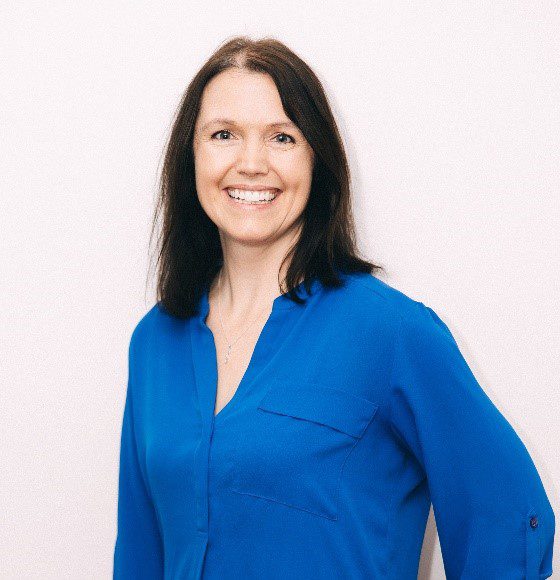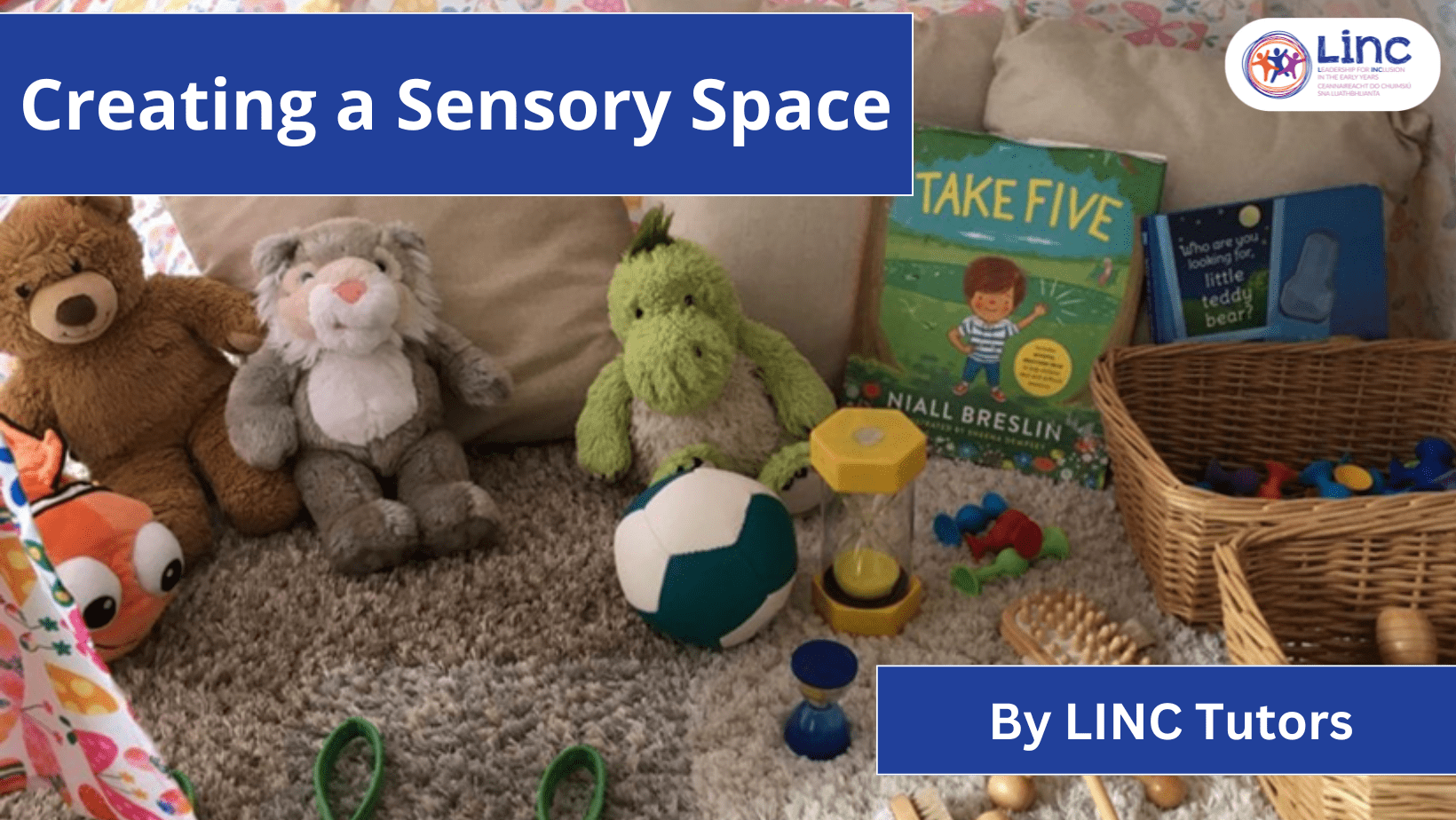Finding Calm in the Chaos:
Realistic Well-Being Tips for Busy Days
In this edition of the LINC Blog, Anne O’Leary, Certified Executive Coach, Postpartum Doula, and Baby Massage Instructor, shares simple and realistic ways to support your well-being on even the busiest of days. From grounding techniques and gentle movement to time management and setting boundaries, Anne offers practical tips that can help you feel more calm, present and in control. Whether you’re working in an early years setting, parenting, or managing both, this blog is full of thoughtful advice to help you care for yourself while caring for others.

One thing I am learning more and more is that our time is finite, however, we so easily give our time away to others. In the rush of daily life, finding time for prioritising ourselves can feel impossible. Between work, family, and other responsibilities, it can all feel relentless and it’s easy to put yourself last (that’s if you even feature on your list!).
But well-being doesn’t have to mean attempting to carve out large chunks of time; which can feel incredibly overwhelming and unrealistic a lot of the time. Small, intentional actions can make a big difference, dotted through our days and weeks.
As a mum of 4, working outside the home 4 days a week, I get how chaotic life can feel, and the need for realistic and achievable ideas to support ourselves day-to-day.
Here are some of my practical, time-efficient strategies to help you feel more grounded, calm, and hopefully in control—even on the busiest of days.
1. Grounding Techniques: Simple Ways to Find Calm Fast
What It Is: Grounding techniques help bring your focus back to the present moment, reducing stress and overwhelming feelings.
Why It’s Important: When you’re pulled in multiple directions, your nervous system can remain in a heightened state. Grounding helps you reset, improving focus and emotional balance.
How to Incorporate It:
- 5-4-3-2-1 Method: Name five things you can see, four things you can touch, three things you hear, two things you smell, and one thing you taste.
- Barefoot Break: Step outside for a minute and feel the ground beneath your feet.
- Cold Water Reset: Run cold water over your hands or splash your face when feeling overwhelmed.
2. Positive Affirmations: Rewire Your Mind in Moments
What It Is: Positive affirmations are short, empowering statements you say to yourself to shift your mindset.
Why It’s Important: The words we tell ourselves shape our reality. When life is hectic, intentional positive reinforcement can help build resilience and self-belief. This is something we often do with the children in our lives, so giving ourselves the same kindness is important.
How to Incorporate It:
- Start your day with one affirmation, such as “I am capable of handling whatever comes my way.”
- Write a phrase on a sticky note and place it somewhere visible.
- One I love, is to use mirror markers for the bathroom/bedroom mirror.
- Set a phone reminder with an affirmation to pop up at midday.

3. Movement Breaks: Energise Your Body and Mind
What It Is: A quick burst of movement that reactivates circulation, reduces tension, and boosts mood.
Why It’s Important: When overwhelmed or drained, movement helps break stagnant energy and releases endorphins for an instant mood lift.
How to Incorporate It:
- Stretch your arms overhead and take a deep breath every hour.
- Do 10 squats or march in place while waiting for the kettle to boil.
- Take a brisk two-minute walk or shake out tension from your hands and shoulders.
- Stick on some music and dance like no one is watching!
4. Time Management: Making Space for What Matters
What It Is: Simple techniques to regain a sense of control over your day. Like I mentioned, our time is finite, so choosing what we do and when we do it where possible is something to have awareness of.
Why It’s Important: Feeling out of control with time fuels stress. Small tweaks in how you manage tasks can create breathing room. Multi-tasking is one area that we try to do but often this costs us more time adding to our stress.
How to Incorporate It:
- Two-Minute Rule: If a task takes less than two minutes, do it immediately.
- Micro-Scheduling: Block five-minute slots for personal resets, like deep breathing or journaling.
- Batching Tasks: Group similar tasks together to reduce mental load and increase efficiency. Try to avoid multi-tasking where possible.

5. Boundaries: Protecting Your Energy
What It Is: Setting clear limits on your time and commitments to prevent burnout.
Why It’s Important: Without boundaries, it’s easy to take on too much, leaving no time for yourself. When we care for others, we often say yes to too many things, as we never want to let others down. However, protecting your energy ensures you can show up fully where it matters most and with whom it matters most.
How to Incorporate It:
- Practice saying, “I can’t right now, but I can do it later.”
- Practice not starting your sentence with “sorry” when you are saying no!
- Limit after-hours work and protect personal time.
- Schedule “no commitment” time into your day, even if just for 10 minutes.
6. Gratitude in Three: A Simple Daily Practice
What It Is: Writing down three things you’re grateful for at the end of each day.
Why It’s Important: Gratitude shifts your focus from what’s stressful to what’s positive, rewiring your brain for resilience and contentment.
How to Incorporate It:
- Keep a small notebook by your bed to jot down three things each night.
- Share one positive moment from your day with a friend or family member.
- Reflect on something that went well, no matter how small.
Small Steps, Big Impact
Please remember, prioritising you is not selfish. You do not need to feel guilty when you are filling your own cup back up. Remember, incorporating “self-care” does not need to be huge gestures, the tiny, consistent actions can have a powerful effect on how you feel.
Take a moment to pick one or two (or more!) of what is mentioned above and try incorporating these strategies into your day—you may be surprised at the difference they make. Finding calm in the chaos isn’t about having more time; it’s about using the moments you do have in ways that will support and sustain you.


Anne O'Leary
Executive Coach | Postpartum Doula | Founder of The Parent NEST
Anne O’Leary is an Executive Coach, Postpartum Doula, and founder of The Parent NEST. With 20 years of experience in corporate finance, operations, and sales, Anne combines her professional expertise with her personal experience as a mum of four to support parents in navigating the transitions of parenthood, family leave, and work-life integration.
Through 1:1 coaching and tailored workshops, Anne helps parents gain clarity, build confidence, and develop strategies to manage the evolving challenges of balancing career and family life. She works with individuals and organisations, offering practical guidance on topics such as managing the mental load, setting boundaries, aligning personal values with career and home life, and easing the transition back to work after parental leave.
In addition to coaching, Anne runs The Circle, an online membership providing community and resources, and delivers in-person classes in Wexford on mum-related topics and baby massage. Her approach is rooted in providing compassionate, actionable support that meets parents where they are and helps them move forward with confidence.
You may also like:

Belonging as the Heart of Inclusion
Belonging as the Heart of Inclusion In this edition of the LINC Blog, LINC National Coordinator Claire Butterly reflects on belonging as the heart of inclusive practice in Early Learning and Care and School-Age Childcare settings. Drawing on the principles of Aistear,...

LINC Shines a Light on Inclusion for the International Day of Persons with Disabilities 2025
LINC Shines a Light on Inclusion for the International Day of Persons with Disabilities 2025 The Leadership for INClusion in the Early Years (LINC) Programme marked the United Nations International Day of Persons with Disabilities (IDPD) this evening by illuminating...

Creating a Sensory Space
Creating a Sensory Space In this edition of the LINC blog, Claire Butterly, Karina Abbott, Ann Donnellan, Carole Dee, Linda Madden, Margaret Joyce and Paula Harte highlight some considerations when planning a sensory space in your Early Learning and Care setting....
